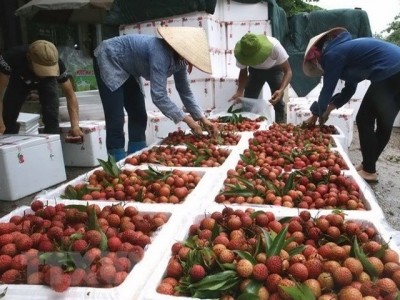Vietnam targets 10 billion USD from fruit, vegetable exports

Lychees for exports (Photo: VNA)
Ho Chi Minh City (VNA) – With the positive outcomes from 2017 and the first quarter of 2018, Vietnam is likely to gross 10 billion USD from exporting fruits and vegetables in the foreseeable future, according to Deputy Minister of Agriculture and Rural Development Le Quoc Doanh.
The Southeast Asian country earned a record 3.45 billion USD from fruit and vegetable exports in 2017, a year-on-year rise of 40.5 percent, much higher than traditional staples like rice, crude oil and coffee.
In January-March this year, Vietnam raked in 960 million USD from fruit and vegetable exports, up 35.6 percent against the same period last year.
Doanh said the country is shifting ineffective rice cultivation areas to grow fruits under the national agricultural restructuring programme.
Provinces in the Mekong Delta region such as Tien Giang, Dong Thap and Can Tho have zoned off large areas for growing fruits, he added.
Furthermore, most farmers in the region are aware of the importance of clean production.
Businesses are investing in technology to increase the quality of products for exports.
Dinh Kim Nhung, director of Kim Nhung Produce Trading Limited Company based in the Mekong Delta, said apart from China, her company is exporting mangoes to the Republic of Korea and Japan.
However, these choosy markets require higher technical procedures, so her business has to invest in processing and irradiation treatment for mangoes, she noted.
Nguyen Ba Tuong, owner of Ba Tuong orchard, in Cai Be district, Tien Giang province, shared that there are still many potential markets in the Middle East. They are willing to pay more to buy Vietnamese fruits such as guavas, dragon fruits, star apples and longans, he said.
Vietnamese fruits and vegetables have been sold across 60 markets worldwide
Có thể bạn quan tâm
 Vietnam’s agriculture exports on track to reach record high
Vietnam’s agriculture exports on track to reach record high In the context of the 4th industrial revolution, the government plans to develop a digital system to introduce effective business models and connect farmers.
 Tra Vinh farmers supported in joining large-scale field model
Tra Vinh farmers supported in joining large-scale field model Farmers join the large-scale field model will also receive subsidy of 30 percent of seed or sapling costs for the first crop.
 New Zealand welcomes VN rambutan
New Zealand welcomes VN rambutan Việt Nam are set to begin exporting rambutans to New Zealand after seven years of trade negotiations between the two countries.